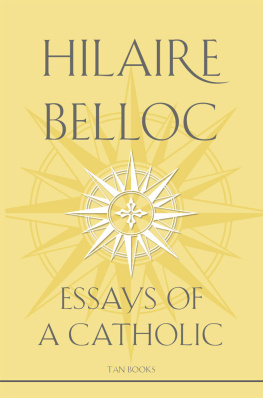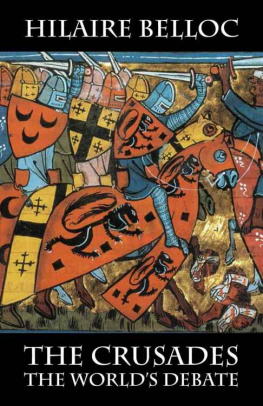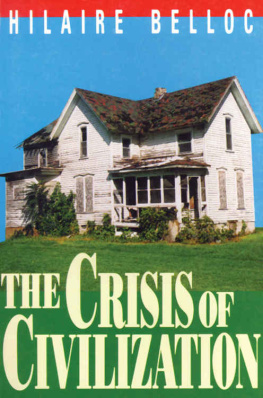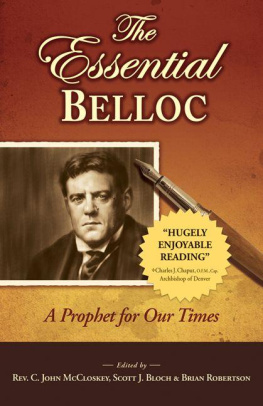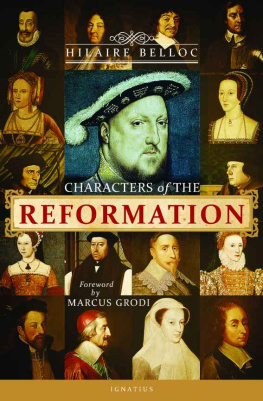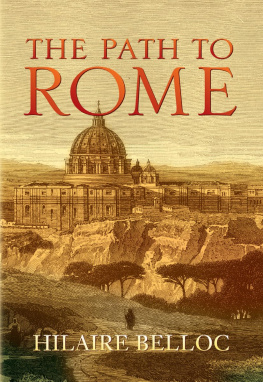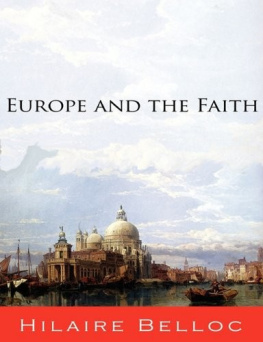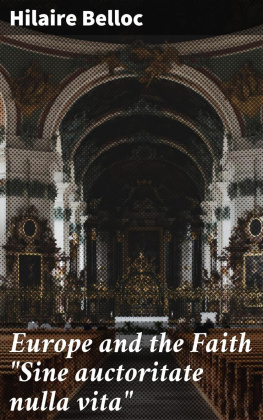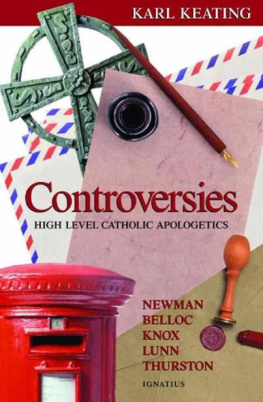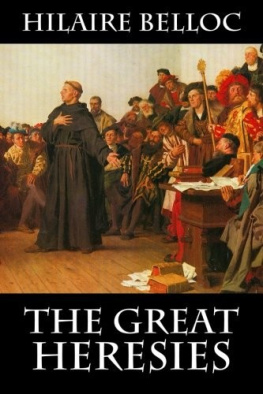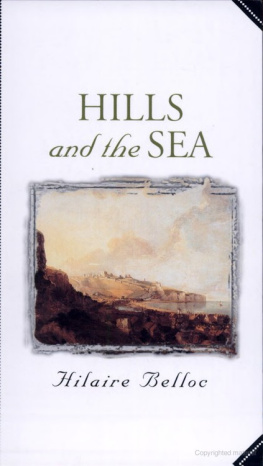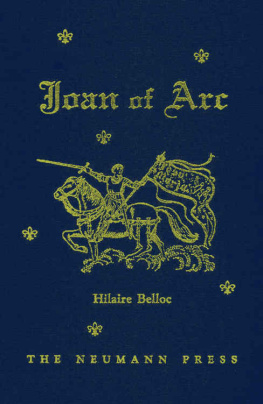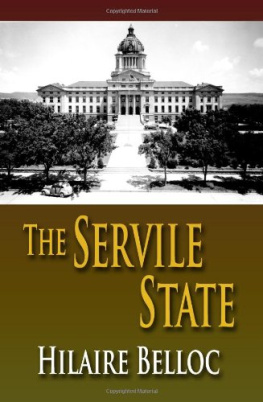Hilaire Belloc - Essays of a Catholic
Here you can read online Hilaire Belloc - Essays of a Catholic full text of the book (entire story) in english for free. Download pdf and epub, get meaning, cover and reviews about this ebook. year: 0, genre: Science. Description of the work, (preface) as well as reviews are available. Best literature library LitArk.com created for fans of good reading and offers a wide selection of genres:
Romance novel
Science fiction
Adventure
Detective
Science
History
Home and family
Prose
Art
Politics
Computer
Non-fiction
Religion
Business
Children
Humor
Choose a favorite category and find really read worthwhile books. Enjoy immersion in the world of imagination, feel the emotions of the characters or learn something new for yourself, make an fascinating discovery.
- Book:Essays of a Catholic
- Author:
- Genre:
- Year:0
- Rating:4 / 5
- Favourites:Add to favourites
- Your mark:
- 80
- 1
- 2
- 3
- 4
- 5
Essays of a Catholic: summary, description and annotation
We offer to read an annotation, description, summary or preface (depends on what the author of the book "Essays of a Catholic" wrote himself). If you haven't found the necessary information about the book — write in the comments, we will try to find it.
Essays of a Catholic — read online for free the complete book (whole text) full work
Below is the text of the book, divided by pages. System saving the place of the last page read, allows you to conveniently read the book "Essays of a Catholic" online for free, without having to search again every time where you left off. Put a bookmark, and you can go to the page where you finished reading at any time.
Font size:
Interval:
Bookmark:
Essays of a Catholic
Hilaire Belloc
Copyright 1931 by Hilaire Belloc
First published in 1931 by The Macmillan Company, New York.
Retypeset and republished in 1992 by TAN Books, then a second typesetting in 2012. The typography in this book is the property of TAN Books, and may not be reproduced, in whole or in part, without written permission from the publisher. (This restriction applies to this type, not to quotations from the book.)
Library of Congress Catalog Card No.: 92-60964
Cover design by Milo Persic.
TAN Books
Charlotte, North Carolina
www.TANBooks.com
2012
TO
CHARLOTTE BALFOUR
BOOKS BY HILAIRE BELLOC
Available From The Publisher In This Series
Europe and the Faith
William The Conqueror
The Crusades
How the Reformation Happened
Characters of the Reformation
Essays of a Catholic
The Great Heresies
Survivals and New Arrivals
The Crisis of Civilization
CONTENTS
PREFACE
T HE papers collected in the following pages are from many sources; they are, as the reader will discover, of very different lengths; they touch upon subjects of very different kinds and very different degrees of importance. I must express my particular gratitude to the proprietors and editor of the Universe for their permission to incorporate parts of certain essays which appeared in their columns, forming about one third of the book. The Universe has given hospitality to my work for many years and also given it the advantage of appearing before the very large and increasing public which it reaches: we all owe it gratitude for the great work it is doing. To the Essays which thus appeared in the Universe I have added, in most cases rewritten much as well as expanded. One of the essays appeared on the other side of the Atlantic in connection with a controversy between the Church and the wealthy Puritans of the northeastern States in an organ peculiarly their own. This also (The Church and the Modern State) I have had to rewrite somewhat; I have included it because the subject is of general interest wherever the Church and State are today in conflict. The Letter to Dean Inge, which I have also retouched slightly, but not in more than a dozen lines, first appearedstrangely enough!in the Evening Standard of London, though it was then under the same proprietorship as it is today. Two of the papers, which break, I believe, fresh ground and which I confess I took special pains over, are that on Usury and the one called Science as the Enemy of Truth.
I must apologize for the personal tone in each of the papers here printed: I can write in no other way, and, indeed, I prefer in reading the writings of others to discover a similar note myself. It has the advantage in the present case of disengaging anyone else of my communion from views I may express, and I hope the reader will recognize my intention in the choice of the title. I have not put forward this book as the Essays of a Catholic in general, which would be presumptuous, but only as the Essays of one chance Catholic, who is but a layman, and, what is more, a layman living in England, where Catholic things appear and live with difficulty.
I do not know whether I ought to apologize for the fact that all these papers deal only with what may be called the externals of religion, are even in great part political, and without exception controversial. I have perhaps no faculty for dealing on paper with the more essential, the all-important, interior things of Catholic life. If ever I have dealt or shall deal with them I am sure I should not sign my name.
H. BELLOC
Kings Land
Shipley, Horsham20th May, 1931
THE NEW PAGANISM
Our civilization developed as a Catholic civilization. It developed and matured as a Catholic thing. With the loss of the Faith it will slip back not only into Paganism, but into barbarism with the accompaniments of Paganism, and especially the institution of slavery. It will find gods to worship, but they will be evil gods as were those of the older savage Paganism before it began its advance towards Catholicism. The road downhill is the same as the road up the hill. It is the same road; but to go down back into the marshes again is a very different thing from coming up from the marshes into pure air. All things return to their origin. A living organic being, whether a human body or a whole state of society, turns at last into its original elements if life be not maintained in it. But in that process of return there is a phase of corruption which is very unpleasant. That phase the modern world outside the Catholic Church has arrived at .
CHAPTER
THE NEW PAGANISM
W E CALL Paganism an absence of the Christian revelation. That is why we distinguish between Paganism and the different heresies; that is why we give the name of Christian to imperfect and distorted Christians, who only possess a part of Catholic truth and usually add to it doctrines which are contradictory of Catholic truth. Moreover, the word Christian, though so vague as to be dangerous, has this much reality about it, that there is something different between the general atmosphere or savor of any society or person or literature which can be called Christian at all and those which are wholly lacking in any part of Christian doctrine. For a Christian man or society is one that has some part of Catholicism left in him. But when every shred of Catholicism is lost we call that state of things Unchristian.
Now, it must be evident to everybody by this time that, with the attack on Faith and the Church at the Reformation, the successful rebellion of so many and their secession from United Christendom, there began a process which could only end in the complete loss of all Catholic doctrine and morals by the deserters. That consummation we are today reaching. It took a long time to come about, but come about it has. We have but to look around us to see that there are, spreading over what used to be the Christian world, larger and larger areas over which the Christian spirit has wholly failed; is absent. I mean by larger areas both larger moral and larger physical areas, but especially larger moral areas. There are now whole groups of books, whole bodies of men, which are definitely Pagan, and these are beginning to join up into larger groups. It is like the freezing over of a pond, which begins in patches of ice; the patches unite to form wide sheets, till at last the whole is one solid surface. There are considerable masses of literature in the modern world, of philosophy and history (and especially of fiction), which are Pagan and they are coalescingto form a corpus of anti-Christian influence. It is not so much that they deny the Incarnation and the Resurrection, not even that they ignore doctrine. It is rather that they contradict and oppose the old inherited Christian system of morals to which people used to adhere long after they had given up definite doctrine.
This New Paganism is already a world of its own. It bulks large, and it is certainly going to spread and occupy more and more of modern life. It is exceedingly important that we should judge rightly and in good time of what its effects will probably be, for we are going to come under the influence of those effects to some extent, and our children will come very strongly under their influence. Those effects are already impressing themselves profoundly upon the Press, conversation, laws, building, and intimate habits of our time.
There are two ways in which this is happening; according to whether the New Paganism is at work in a Catholic or a non-Catholic country. It is happening in Catholic countries by the separation of a Pagan set from the rest of the citizens. In those countries the full body of Christian doctrine, that is, Catholicism, puts up a permanent and successful resistance. Its consequences in morals are accepted by masses of people who do not practice the Catholic religion or who are indifferent to its doctrines, and this resistance shows no sign of weakening; not everywhere are the governments of Catholic countries in sympathy with Catholic tradition, however vague, but in these countries the laws defending morals and the general habits of people outside the Pagan set may properly be called anti-Pagan.
Next pageFont size:
Interval:
Bookmark:
Similar books «Essays of a Catholic»
Look at similar books to Essays of a Catholic. We have selected literature similar in name and meaning in the hope of providing readers with more options to find new, interesting, not yet read works.
Discussion, reviews of the book Essays of a Catholic and just readers' own opinions. Leave your comments, write what you think about the work, its meaning or the main characters. Specify what exactly you liked and what you didn't like, and why you think so.

